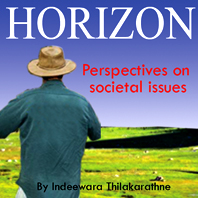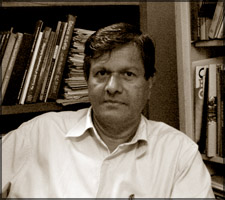Ethnic identity and national integration
 Identity politics has dominated the political landscape in many parts
of the world in recent years. In most of these situations, ethnicity,
religion and language have figured prominently either separately or in
combination with one and another said Prof. S.T Hettige, Professor of
Sociology at the University of Colombo on the Ethnic Identity and
National Integration. Identity politics has dominated the political landscape in many parts
of the world in recent years. In most of these situations, ethnicity,
religion and language have figured prominently either separately or in
combination with one and another said Prof. S.T Hettige, Professor of
Sociology at the University of Colombo on the Ethnic Identity and
National Integration.
Today, ethnicity plays a dominant role in national politics in Sri
Lanka and has virtually replaced social class as a basis for political
mobilization in the country.
Though national politics at independence was influenced by adversary
class politics, before long ethno-linguistic identity emerged as a key
factor shaping national political discourse and subsequent electoral
outcomes.
Contrary to the popular explanation based on modernization theory,
post colonial nations did not march towards a broader national identity
based on social citizenship weakening primordial identities.
|

Prof. Hettige |
Though the outcome may be natural in the eyes of post-structuralist
and post modernist writers who would argue that it is futile to strive
for uniformity in the face of great social and cultural diversity, the
pertinent issue here is not the uniformity or plurality but the complex
relationship between the two in a particular society.
It can be argued here that dynamics between broader national identity
based on social citizenship and socio- cultural plurality is, by and
largely, dependent on the very nature of a range of institutions. Here
the focus is on education as a major contributory factor in identity
formation and offering life chances in modern societies.
Education in Post- Colonial Sri Lanka
Two watersheds in education in post-colonial Sri Lanka were the
introduction of universal free education in 1944 and the Swabasha
education for all children in the 1950s. Consequently, this resulted in
the abolition of almost all private schools, absorbing them into the
state education system.
As the medium of instruction switched to Swabasha, for the first time
children belonging to diverse ethnicities and languages were segregated
on ethno-linguistic lines.
Though the state policy on medium of instruction was not intended to
segregate children, it resulted in educational segregation based on
ethno-linguistic lines in all parts of the country.
Segregation in these critical and formative years of children,
naturally, has a decisive impact on the formation of their self
identities. The nature of school curriculum and way the literature,
religion and language and other allied subjects are taught also play a
pivotal role in identity formation.
Significantly there is a nexus between school curriculum and
ethno-linguistic identity of a school. While certain subjects are common
to all schools, children have a choice with regard to the language,
literature and religion they choose to study.
So, the Sinhalese children usually study the Sinhala language,
Sinhala literature and Buddhism as subjects, while Tamil children in
general study Tamil language, Hindu religion and Tamil literature. The
pattern is broadly similar for Muslim students.
As for other religious groups, such as Catholics, and Protestants,
children often attend schools belonging to their respective
denominations. However, depending on the ethnic identity, they may study
their own language and literature.
So, if a Sinhala- Buddhist child attends a Sinhala- Buddhist school
and learns only his own language, he or she is likely to develop a
strong Sinhala Buddhist identity.
The same pattern is replicated with respect to other ethno-
linguistic groups. If children continue to remain in school till they
reach the age of 18 or 19 years, as many children do today, they might
grow up with little or no contact with children and youth belonging to
other ethno-linguistic groups.
 As
there is hardly any first hand contact or interaction with groups other
than their own, they are likely to uncritically accept widely held
popular perceptions, attitudes, prejudices, stereo- types, etc. about
the other. As
there is hardly any first hand contact or interaction with groups other
than their own, they are likely to uncritically accept widely held
popular perceptions, attitudes, prejudices, stereo- types, etc. about
the other.
Monolingual children are usually unable to access information in a
language other than one’s own. For instance, they cannot read books,
newspapers, magazines, etc. published in other languages. Access to
modern media such as radio and TV is also determined by linguistic
skills.
Since the educational segregation existed for over fifty years, it
has been producing generations of monolingual students, teachers and
also influential groups in society such as media personnel, public
servants, politicians and law enforcement officers who could not
interact with each other across ethno-linguistic lines owing to their
inability to communicate in a common language.
Sri Lankan society today is clearly segmented on ethno- linguistic
lines.
The world views of most people are closely connected with their own
language, ethnicity and religion.
This becomes evident in public opinion surveys on social and
political issues. Most of the political parties in the country are
closely identified with different ethno- linguistic groups. Many people
look at issues from the lens of their own particularistic group.
They do not seem to perceive a common future or a common destiny that
transcends the parochial aspirations of diverse communities. The
national political processes are primarily concerned with the inter-
community competition for power, resources and recognition.
The political loyalties are constantly shifting depending on
opportunities to gain power and resources. Only thing that is relatively
stable appears to be the group identity itself.
Segmentation of population on ethno-linguistic lines at national
level for power and resources has been trickled down to local level and
perceive one another as competitors for scarce local resources such as
land, business opportunities, employment, and public space and control
our local institutions.
So the identity politics at the national level constantly influences
inter- community relations at the local level and vice versa. It is
significant that inter-community rivalry is least pronounced among urban
slums dwellers on whom education had the least influence.
Education, Politics and National Integration
Identity formation is a process that is intricately connected with
family, immediate community and, local institutions. Children come into
contact with the school early in life and therefore, the latter plays a
critical role in the process.
As mentioned earlier, the actual role of the school is determined by
a range of factors such as the medium of instruction, composition of the
school population and the nature of the curriculum.
On the other hand, there are other institutions that can also
reinforce or moderate the influence of education on identity formation
such as religious organizations, political parties, the media and public
institutions, law enforcement and civil administration.
It has been a well-documented fact that anti-colonial nationalist
elite united at the time of independence and minority political leaders
(Tamil political leaders) did not favour the post independence
constitution and the centralized parliamentary system which they felt
favoured majority ethnic community
For instance, most public institutions are largely staffed by
monolingual Sinhala- educated officers who cannot satisfactorily deal
with equally monolingual members of minority communities.
Introduction of Swabhasha education at university level perpetuates
educational segregation which was reinforced by the establishment of
regional universities. A major stumbling block in the emergence of
social citizenship transcending social and cultural divisions is the
increasing segmentation of society on ethno-linguistic lines.
Though education is not the only factor that influences identity
formation, it has become a critical factor in post independence Sri
Lanka. The need to change it may not be felt by certain sectarian
interests that benefits from the system. However, it is imperative to
alter it in order to build a broader sense of social citizenship.
As the state has become a place for competition among diverse groups
for sectarian interests and public resources are controlled and used by
dominant sectarian groups offering privileges to selected constituencies
in return for political loyalties. This prevents the development of a
broader social citizenship based on equality, social justice, and
rights.
Educational Reforms, Ethnic Identity and Social Citizenship
Though the formation of ethnic identities in post colonial societies
predates colonialism, it has been solidified due to various reasons
during the colonial period. However the emergence of the post colonial
state with constitutional and representative democracy resulted in
politicizing ethnicity.
Propagation of state led education offered opportunities for
competing ethnic groups and classes and aspiring marginalized groups for
much valued public service jobs and access to education became a
critical issue.Ethno- linguistic segregation with in the education
system minimizes inter- group interaction and cultural exchange, both of
which can weaken ethnic exclusivity.
So, if we wish to bring ethnic communities closer to each other,
policy interventions in the education sector are critically important.
While the promotion of bilingualism is one such policy intervention,
curricular reforms aimed at promoting inter- cultural understanding and
ideas of secularism can be considered as equally important.
These steps are indispensable in combating ethnic prejudice,
discrimination, mutual mistrust and intolerance. Yet, very little was
done in this area, even by international donors concerned with issues of
national integration and peace. |
